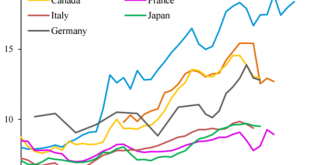from Lars Syll Modern economics is sick. Economics has increasingly become an intellectual game played for its own sake and not for its practical consequences for understanding the economic world. Economists have converted the subject into a sort of social mathematics in which analytical rigour is everything and practical relevance is nothing … If there is such a thing as “original sin” in economic methodology, it is the worship of the idol of the mathematical rigour invented by Arrow and...
Read More »DSGE models can be even worse in practice
from David Richardson There have been numerous postings on this blog that go the problems associated with dynamic stochastic general equilibrium models. Most of these posts have questioned their use in the hands of the high priests of the orthodox economics profession. For example, Lars Syll has said “DSGE models are simply — from both empirical and methodological points of view — not suited for understanding modern monetary economies” (28 Nov 2018). I have no argument at all with this...
Read More »Economists have no ears
from Steve Keen Thomas Kuhn once famously described textbooks as the vehicle by which students learn how to do “normal science” in an academic discipline. Economic textbooks clearly fulfil this function, but the pity is that what passes for “normal” in economics barely deserves the appellation “science”. Most introductory economics textbooks present a sanitised, uncritical rendition of conventional economic theory, and the courses in which these textbooks are used do little to counter...
Read More »Inequalities, societies and “alternative facts”
from Ken Zimmerman There are inequalities and then there are inequalities. In any society, some members are taller, smarter, run faster, are better at math, build houses better, etc. than other members. In most societies these are not converted into inequalities in food, clothing, housing, wealth, and the other necessities for staying alive. And they have little effect on one’s status and prestige and power within the society. Durkheim wrote about it. It’s called “division of labor.”...
Read More »Trump Up in Polls; Who Benefits From Economic Growth?
GDP growth up, stock market up, will the economic expansion continue and who are the winners? Dean Baker and Randall Wray join host Paul Jay Subscribe to our page and support our work at https://therealnews.com/donate.
Read More »Share of income earned by Top 1 Percent, 1975-2015 – 7 countries
Debunking NAIRU
from Lars Syll In our extended NAIRU model, labor productivity growth is included in the wage bargaining process … The logical consequence of this broadening of the theoretical canvas has been that the NAIRU becomes endogenous itself and ceases to be an attractor — Milton Friedman’s natural, stable and timeless equilibrium point from which the system cannot permanently deviate. In our model, a deviation from the initial equilibrium affects not only wages and prices (keeping the rest of...
Read More »Why climate change facts have trouble surviving and neoliberal economic facts do not
from Ken Zimmerman Today there is as much, if not more consensus among scientists about global climate change as there was 300 years ago about the laws of thermodynamics and the laws of motion. Polling shows that majorities of “ordinary” people in the USA, Europe, Asia, etc. accept the conclusions of this science. Yet around the world opposition to the science of climate change is well funded, unyielding, and denies the science at the highest levels of government and science. What...
Read More »The spectre of higher oil prices
from C .P. Chandrasekhar and Jayati Ghosh On May 2, the Trump administration brought to an end the waiver the US had granted eight countries, including India, of sanctions on imports of oil from Iran. Having pulled out of the 2015 multi-country agreement with Iran to limit its nuclear programme, the US government had invoked the nuclear threat from that country to impose sanctions. The most damaging element of those sanctions for both Iran and the world’s oil importers was the ban this...
Read More »The Dean! Jade Baker & Kylie Kingston
https://magazineuber.blogspot.com/ Jade Baker has just been enrolled in an all-girls Ivy League school; however, she’s having a little trouble fitting in… Jade’s been caught vandalizing, skipping class and even having sex on school property! Jade is called into principle Kylie Kingston’s office to await her punishment.
Read More » Real-World Economics Review
Real-World Economics Review






